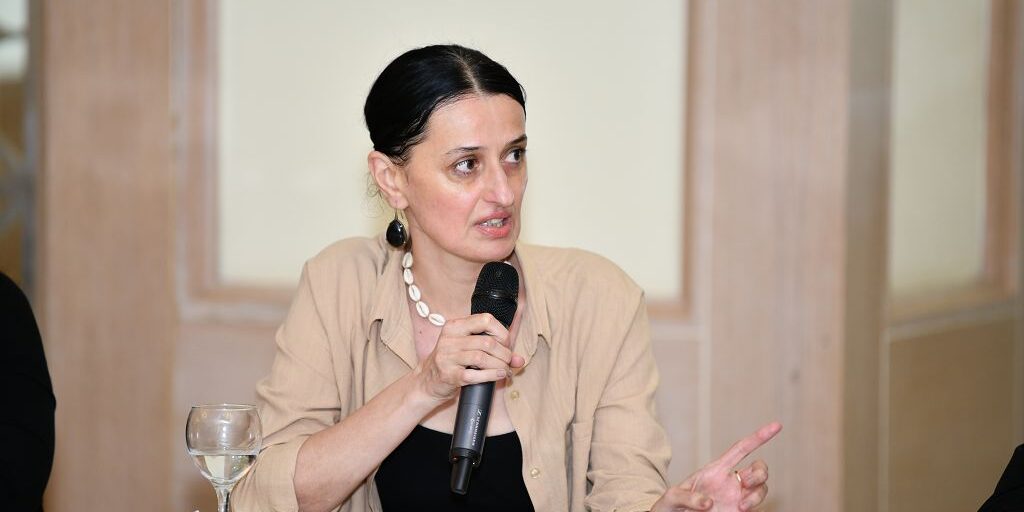On September 26, the Azerbaijan Union of Filmmakers (AUF) held a board meeting at the Nizami Cinema Centre. This was the first such meeting since the merger of the Azerbaijan Union of Filmmakers and the Union of Filmmakers of the Republic of Azerbaijan that took place on March 5.
The meeting addressed pressing issues facing the Azerbaijani film industry. A primary concern is the current state of the Azerbaijanfilm studio. AUF advocates for the swift restoration of Azerbaijanfilm’s operations and the preservation of its historical significance in national film production. The meeting also proposed granting the studio “national” status, a designation that would protect its historic heritage, like other former Soviet film studios.
AUF Chairman Rasim Balayev discussed the challenges facing the film studio and emphasized the importance of inviolability of its physical territory. While there is currently no official data on the exact size of the Azerbaijanfilm territory (it covered 14 hectares during the late Soviet period), today it is believed to cover approximately 7 hectares. Rasim Balayev said that Culture Minister Adil Karimli has assured him that steps will be taken to legally reclaim any land that was improperly acquired from the film studio.
Another serious point of concern among filmmakers is the outdated nature of the 1998 Law on Cinema and the Cabinet of Ministers Resolution No. 38 which was issued in 1997. Today, these outdated regulations hinder the film production process. In May, AUF Chairman Rasim Balayev addressed Prime Minister Ali Asadov regarding this issue.
It is crucial to bring forward this issue with Polad Bulbuloghlu, the Chairman of the Culture Committee of the National Assembly (Milli Majlis), who has worked as the Minister of Culture for a long time, is a professional administrator in the field of culture, and knows the details of the existing problems in the field of cinema well.
There’s a common misconception that the best Azerbaijani films were made exclusively during the Soviet period. While there’s some truth to this, our contemporary cinema has produced documentaries and feature films that challenge this notion. To foster a more nuanced perspective and promote our contemporary cinema, the idea of creating a dedicated TV channel broadcasting national films was proposed at the meeting. Such a channel would expose viewers to new works and could even include an informative, analytical programs on cinema.
In today’s globalized world, the rapid influx of harmful trends, foreign cultures, and ideologies into our lives underscores the importance of children’s cinema. Another issue raised at the meeting was the need to prioritize children’s cinema and adopt a State Program to support its development and growth. Additionally, the importance of government funding for this field was emphasized. Children’s cinema, including animation, is a crucial component of a national policy in all countries and plays a vital role in shaping national identity.
AUF prioritizes regular projects and screenwriting competitions on diverse themes, as well as increasing the availability of film literature in Azerbaijani language. Though AUF is actively working in this direction, the meeting emphasized the need for more intensive attention to organization of competitions and publishing cinema literature, both original and translated.
The first meeting of the new AUF Board of Directors was productive, addressing the issues outlined above and others, which were subsequently reflected in the subsequent official statement.
Finally, one important point remains to be highlighted. While the meeting did critique certain aspects of the official bodies responsible for cinema, it also emphasized the importance of fostering a collaborative relationship between AUF and the Ministry of Culture and its Cinema Agency. As a public organization, AUF has the right and responsibility to oversee and criticize the actions of official bodies, ensuring transparency, accountability, and adherence to the law.
President Ilham Aliyev has repeatedly stressed the importance of robust public oversight in his speeches. Let us recall some of his remarks on this subject:
“I want to say this again: without the public oversight we can’t achieve what we want. What does public oversight mean? People need to be even more active. When faced with unpleasant facts, they should report them, so that we could adjust our work and prevent the negative phenomena. If we achieve this, the price of oil will not matter a lot for us.”
“Members of the public should be involved in the implementation of all the projects that are of great importance to us. […] Scientists, non-governmental organizations, experts, representatives of the media – let them take part in this work as well. Let them put forward proposals as well. In other words, the broad public should be involved in this work. In that case, our work will be more comfortable, and the cost control mechanism will have several tiers.”
We will do our best to ensure that AUF develops and implements projects that align with the vision of our nation’s leadership and meet the needs of film professionals.
Sevda Sultanova, AUF Board Member

